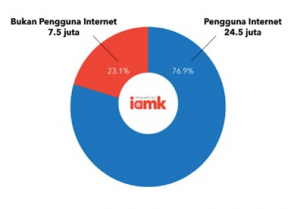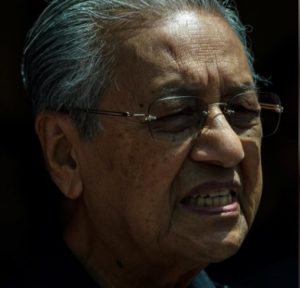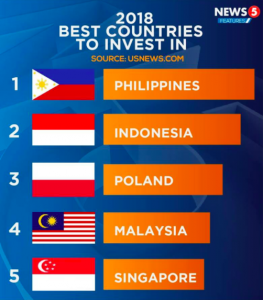by Muhammad Faiz bin Mokhtar
It has been two weeks since the event that changed the lives of not just Muslims, but to the rest of the world as well. The world is stunned by the news of the man who shot 50 people in a mosque (ABC News New Zealand, 2019). This event will be a lasting memory in the minds of the people of the world. This act is not only devastating to the people around the world, but more importantly, the lives of their families as well as those who knew the victims personally. New Zealand, a country known for extreme sports such as bungee jumping and friendly people, is left shocked as such a crime is known to be rare in the country.in their history. As the incident is the first of its kind in New Zealand’s history, all media have been covering the incident on large scale for the few weeks. This has given journalists a chance to inform the public about the shooting and its aftermath.
Social media presents a medium that is a cost-effective, which means it is interactive, association and co-formation above communication that is one-to-many; integrates communication and distribution channels, provides customization opportunities, and delivers greater speed to the information communication and feedback (Shilbury, Westerbeck, Quick, Funk, & Karg, 2014) . Social media has given the platform for people to voice their concerns and it is a way that news can travel instantaneously into the minds of the citizens of the world. Internet presents a virtual public community allowing citizens to discuss public issues and make their voices heard (Zhou & Moy, 2007). When comparing with the traditional Internet and communication technologies (ICTs), social media manages the conversation content or interaction as an artifact of information in an online environment (Yates & Paquette, 2010).
However, social media has become a message channel for the shooter to livestream his actions for the world to see. The shooter, armed with automatic rifle, gunned down 50 patrons of the mosque and he filmed the shooting live-streamed on Facebook (Wakefield, 2019). The video has been shared on social media through all platforms, Facebook, Twitter, Instagram and YouTube, in which millions have watched this act of terror through their phones, laptops and tablets. Social media, despite its reach to reach millions of the world, has showcased to the users themselves what kind of content that they might see. Impressionable people may follow suit and some would be fearful of the world due to the fact that it is shown by the social media itself. Online media allows netizens to share their opinions, retorts, or pass remarks about a certain phenomenon (Ekawati, 2018).
Jacinda Ardern, a leader that sets the example
The world is left shocked and astonished by the act of the shooter, but one woman stood out among them all, the New Zealand Prime Minister Jacinda Ardern. Being a leader, one must show compassion towards the victims, strength for the people to look upon and wisdom for her actions. Ardern is an example of how a leader should act. Rather than just offer condolences and sympathy, she showed compassion for the victims’ families. A disaster or an event that changes the perception of a nation will make the people around the world to shift their focus on her. As a leader, she must be an example to other leaders on how to act in times of distress and chaos. The picture below shows that she’s wearing a headscarf, which depicts her respect towards the victims’ religion and culture.
“You may have chosen us,” said Ardern, referring to the killer, anger in her voice. “But we utterly reject and condemn you.” (Roy, 2019)
“She has shown a quiet, strong leadership, and been very focused on looking after the people who are most affected straight away. The killer has barely been mentioned.” (Roy, 2019)
In The Guardian’s article, Roy interviewed Paul Buchanan, a security expert in the 36th Parallel. Buchanan commented that:
“Saying that her strength was her empathy, and she has “excelled” in this arena during a time of crisis. She is also an expert delegator, Buchanan says, and has delegated security reviews and inquiries about how the killer was missed to senior, trusted colleagues, allowing her to focus on healing a traumatized country.
“She is like the mother of the nation. When it comes to events like this, I think her touch is near perfect,” says Buchanan.
“The way Trump and others talk, tough talk, after terror attacks, all that is posturing. And sometimes it is designed to mask weakness, sometimes it is a thirst for revenge. Ardern is doing none of that.”
“It is a leadership style that particularly suits New Zealand. New Zealand does have a serious dark side, it does have racism. But what she is doing is giving us a moment to confront these demons, this darkness and change our ways.”
Extracted from (Roy, 2019) article when interviewed Paul Buchanan, security expert in the 36th Parallel. https://www.theguardian.com/world/2019/mar/19/real-leaders-do-exist-jacinda-ardern-uses-solace-and-steel-to-guide-a-broken-nation
The traits that a true leader should have exhibited under intense situation which are Compassion, truthfulness and composure. Therefore, it is no surprise that the world is lauding her and giving her positive comments along with support for her stance on the subject. People worldwide have been commending Arden’s actions throughout the whole ordeal.
A leader should always be quick in responding to critical or emergency situations such as the mass shooting. This can be seen in Arden’s decision to push for the ban on semi-automatic and automatic rifles in New Zealand. Not only that, owners of rifles too have resorted to relinquishing their own rifles in wake of the shooting out of respect (Graham-McLay, 2019).
New Zealand: Citizen’s response
New Zealand, a small nation east of Australia, known for agriculture and extreme sports was tested with an event that has changed the way people see the world nowadays – that the world is indeed full of violence and hatred. As covered in the article, the world is shocked by the actions of one man who went into a place of worship and had committed a massacre. What is astonishing is the level of solidarity among New Zealanders post-shooting. They have been offering victims sympathy, empathy, as well as have been helping the victims to overcome trauma and grief. Social media has become a tool used by people all over the world to send messages of support and love to the victims. Hashtags have been used on Twitter to discuss the mass shooting. One can easily find the messages for the victims posted under hashtags related to the incident.
The New Zealanders have shown solidarity by standing outside the mosques in a line to which can represents that they are willing to protect what they considered to be their brothers and sisters despite the difference in religion, culture and skin color. Not only that, the incident also prompted some of the New Zealanders to learn more about Islam. Some of them even converted to Islam after the incident. Sonny Bill Williams, a New Zealand All-Blacks Rugby Star is one of the famous names in the Islam and he even visited the victims who were being treated to provide support. Recently, his mother and teammate, Offa Tuungafasi, converted to Islam as well (Astro , 2019).
In conclusion, the media has the power to shape the perception of the people in the world. Along with that, the media could lead to people thinking that the world might be a dangerous place to live in, but there is kindness in this world and the people of New Zealand along with their leader, Ardern, have exhibited those traits. In memory of the victims, I would like to ask for all of us to pray for the fallen victims.
References
ABC News New Zealand. (2019, March 19). Christchurch shooting death toll rises to 50 after one more victim discovered at mosque. Retrieved from ABC News (Australian Broadcasting Corporation): https://www.abc.net.au/news/2019-03-17/christchurch-shooting-death-toll-rises-to-50-new-zealand/10909288
Astro , A. (2019, March 27). Beberapa hari susulan tragedi Christchurch, ibu serta rakan baik Sonny Bill Williams masuk Islam. Retrieved from Astro Awani: http://www.astroawani.com/berita-dunia/beberapa-hari-susulan-tragedi-christchurch-ibu-serta-rakan-baik-sonny-bill-williams-masuk-islam-202370
Ekawati, R. (2018). PRAGMATIC ANALYSIS OF ANGER EXPRESSION USED BY NETIZEN ON ROHINGYA REFUGEES IN WEBSITE . Skripsi thesis, Universitas Muhammadiyah Surakarta., 1-16.
Graham-McLay, C. (2019, July 13). New Zealand Begins Gun Buyback Prompted by Mosque Attacks. Retrieved from NYTimes.com: https://www.nytimes.com/2019/07/13/world/asia/new-zealand-guns.html
Roy, E. A. (2019, March 19). ‘Real leaders do exist’: Jacinda Ardern uses solace and steel to guide a broken nation. Retrieved from The Guardian Online: https://www.theguardian.com/world/2019/mar/19/real-leaders-do-exist-jacinda-ardern-uses-solace-and-steel-to-guide-a-broken-nation
Shilbury, D., Westerbeck, H., Quick, S., Funk, D., & Karg, A. (2014). Strategic sport marketing Fourth Edition. Sydney: Allen & Unwin.
Wakefield, J. (2019, March 19). Christchurch shootings: Social media races to stop attack footage. Retrieved from BBC News: https://www.bbc.com/news/technology-47583393
Yates, D., & Paquette, S. (2010). Emergency Knowledge Management and Social Media Technologies: A Case Study of the 2010 Haitian Earthquake. ASIS&T ’10 Proceedings of the 73rd ASIS&T Annual Meeting on Navigating Streams in an Information Ecosystem – Volume 47 (pp. 1-9). Pittsburgh: American Society for Information Science .
Zhou, Y., & Moy, P. (2007). Parsing Framing Processes: The Interplay Between Online Public Opinion and Media Coverage. Journal of Communication ISSN 0021-9916, 78-98.






 In a recent survey of the top 20 countries to invest in, Malaysia made it to the number 4 position, and the best part is, for once, we triumphed over Singapore which was placed in fifth position.
In a recent survey of the top 20 countries to invest in, Malaysia made it to the number 4 position, and the best part is, for once, we triumphed over Singapore which was placed in fifth position.





 “It’s not like when you are in the UK, you can feel relaxed and take it easy. The demand is always higher as a foreigner since priorities are given to the locals. So as a foreigner I needed to prove that I was better than them”
“It’s not like when you are in the UK, you can feel relaxed and take it easy. The demand is always higher as a foreigner since priorities are given to the locals. So as a foreigner I needed to prove that I was better than them” Source: Facebook, Maravilla Ariff AB
Source: Facebook, Maravilla Ariff AB Ariff AB’s type of music is well-received in the UK and it’s proven when he was offered to do a UK tour for two months around England in which he played at different venues almost every day. He also performed at the Oxjam Islington 2016 festival. There is nowhere to go but up for Ariff AB. He could be the next Yuna in the music industry and make Malaysia proud. You can listen to Ariff AB songs
Ariff AB’s type of music is well-received in the UK and it’s proven when he was offered to do a UK tour for two months around England in which he played at different venues almost every day. He also performed at the Oxjam Islington 2016 festival. There is nowhere to go but up for Ariff AB. He could be the next Yuna in the music industry and make Malaysia proud. You can listen to Ariff AB songs 





